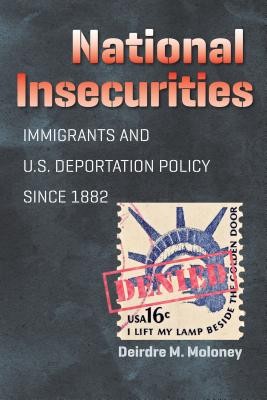
- We will send in 10–14 business days.
- Author: Deirdre M Moloney
- Publisher: University of North Carolina Press
- ISBN-10: 1469628341
- ISBN-13: 9781469628349
- Format: 15.6 x 23.4 x 1.9 cm, softcover
- Language: English
- SAVE -10% with code: EXTRA
Reviews
Description
For over a century, deportation and exclusion have defined eligibility for citizenship in the United States and, in turn, have shaped what it means to be American. In this broad analysis of policy from 1882 to present, Deirdre Moloney places current debates about immigration issues in historical context. Focusing on several ethnic groups, Moloney closely examines how gender and race led to differences in the implementation of U.S. immigration policy as well as how poverty, sexuality, health, and ideologies were regulated at the borders.
Emphasizing the perspectives of immigrants and their advocates, Moloney weaves in details from case files that illustrate the impact policy decisions had on individual lives. She explores the role of immigration policy in diplomatic relations between the U.S. and other nations, and shows how federal, state, and local agencies had often conflicting priorities and approaches to immigration control. Throughout, Moloney traces the ways that these policy debates contributed to a modern understanding of citizenship and human rights in the twentieth century and even today.
EXTRA 10 % discount with code: EXTRA
The promotion ends in 18d.19:12:00
The discount code is valid when purchasing from 10 €. Discounts do not stack.
- Author: Deirdre M Moloney
- Publisher: University of North Carolina Press
- ISBN-10: 1469628341
- ISBN-13: 9781469628349
- Format: 15.6 x 23.4 x 1.9 cm, softcover
- Language: English English
For over a century, deportation and exclusion have defined eligibility for citizenship in the United States and, in turn, have shaped what it means to be American. In this broad analysis of policy from 1882 to present, Deirdre Moloney places current debates about immigration issues in historical context. Focusing on several ethnic groups, Moloney closely examines how gender and race led to differences in the implementation of U.S. immigration policy as well as how poverty, sexuality, health, and ideologies were regulated at the borders.
Emphasizing the perspectives of immigrants and their advocates, Moloney weaves in details from case files that illustrate the impact policy decisions had on individual lives. She explores the role of immigration policy in diplomatic relations between the U.S. and other nations, and shows how federal, state, and local agencies had often conflicting priorities and approaches to immigration control. Throughout, Moloney traces the ways that these policy debates contributed to a modern understanding of citizenship and human rights in the twentieth century and even today.


Reviews